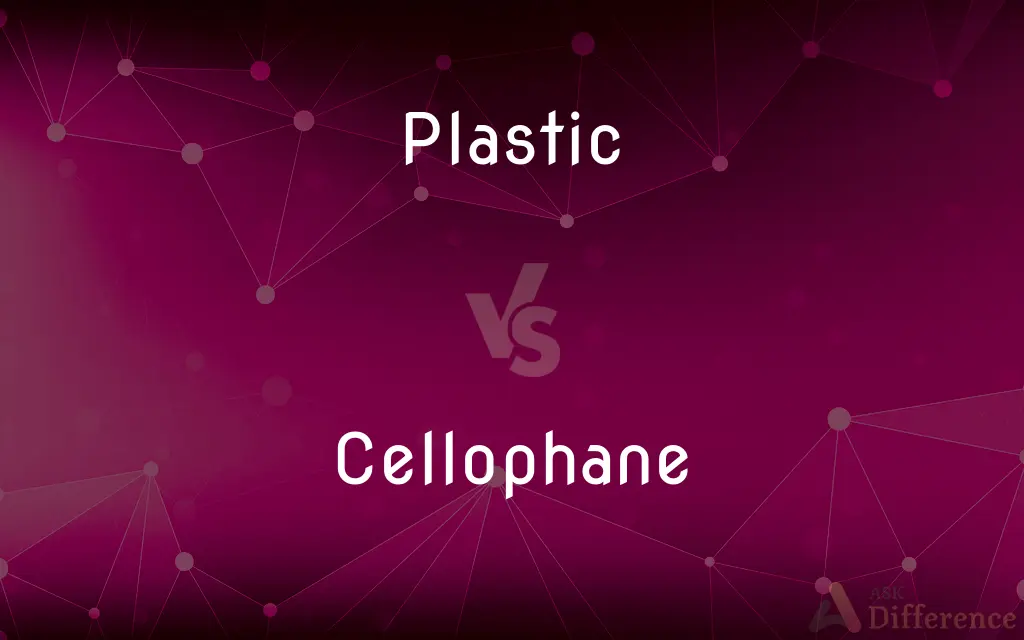Plastic vs. Cellophane — What's the Difference?

Difference Between Plastic and Cellophane
ADVERTISEMENT
Compare with Definitions
Plastic
Plastics are a wide range of synthetic or semi-synthetic materials that use polymers as a main ingredient. Their plasticity makes it possible for plastics to be moulded, extruded or pressed into solid objects of various shapes.
Cellophane
Cellophane is a thin, transparent sheet made of regenerated cellulose. Its low permeability to air, oils, greases, bacteria, and water makes it useful for food packaging.
Plastic
A synthetic material made from a wide range of organic polymers such as polyethylene, PVC, nylon, etc., that can be moulded into shape while soft, and then set into a rigid or slightly elastic form
Mains pipes should be made of plastic or copper
Bottles can be made from a variety of plastics
Cellophane
A thin transparent wrapping material made from viscose
A cellophane bag
Plastic
Made of plastic
Plastic bottles
ADVERTISEMENT
Cellophane
A thin, flexible, transparent cellulose material made from wood pulp and used as a moistureproof wrapping.
Plastic
(of a substance or material) easily shaped or moulded
Rendering the material more plastic
Cellophane
Plastic wrap.
Plastic
Capable of being shaped or formed
Plastic material such as clay.
Cellophane
Any of a variety of transparent plastic films, especially one made of processed cellulose.
Plastic
Relating to or dealing with shaping or modeling
The plastic art of sculpture.
Cellophane
(transitive) To wrap or package in cellophane.
Plastic
Having the qualities of sculpture; well-formed
"the astonishing plastic beauty of the chorus girls" (Frank Harris).
Cellophane
A transparent paper-like product made of regenerated cellulose, produced in sheets and rolls, which is impervious to moisture and germs, and which is used to wrap candy, cigarettes, and a wide variety of other products for distribution and retail sale; as, a pack of cigarettes in a cellophane wrapper.
Plastic
Giving form or shape to a substance
The plastic forces that create and wear down a mountain range.
Cellophane
A transparent paper-like product that is impervious to moisture and used to wrap candy or cigarettes etc.
Plastic
Easily influenced; impressionable
"The plastic mind of the bank clerk had been ... distorted by what he had read" (Rudyard Kipling).
Plastic
Made of a plastic or plastics
A plastic garden hose.
Plastic
(Physics) Capable of undergoing continuous deformation without rupture or relaxation.
Plastic
Capable of building tissue; formative.
Plastic
Able to change and adapt, especially by acquiring alternative pathways for sensory perception or motor skills. Used of the central nervous system.
Plastic
Marked by artificiality or superficiality
A plastic world of fad, hype, and sensation.
Plastic
(Informal) Of or obtained by means of credit cards
Plastic money.
Plastic
Any of various organic compounds produced by polymerization, capable of being molded, extruded, cast into various shapes and films, or drawn into filaments used as textile fibers.
Plastic
(Informal) A credit card or credit cards
Would accept cash or plastic in payment.
Plastic
A synthetic, solid, hydrocarbon-based polymer, whether thermoplastic or thermosetting.
Plastic
Credit or debit cards used in place of cash to buy goods and services.
Plastic
Insincerity; fakeness, or a person who is fake or arrogant, or believes that they are better than the rest of the population.
Plastic
An instance of plastic surgery.
Plastic
(obsolete) A sculptor, moulder.
Plastic
(archaic) Any solid but malleable substance.
Plastic
Capable of being moulded; malleable, flexible, pliant.
Plastic
Producing tissue.
Plastic
(dated) Creative, formative.
Plastic
(biology) Capable of adapting to varying conditions; characterized by environmental adaptability.
Plastic
Of or pertaining to the inelastic, non-brittle, deformation of a material.
Plastic
Made of plastic.
Plastic
Inferior or not the real thing.
Plastic
Fake; insincere.
Plastic
Having the power to give form or fashion to a mass of matter; as, the plastic hand of the Creator.
See plastic Nature working to his end.
Plastic
Capable of being molded, formed, or modeled, as clay or plaster; - used also figuratively; as, the plastic mind of a child.
Plastic
Pertaining or appropriate to, or characteristic of, molding or modeling; produced by, or appearing as if produced by, molding or modeling; - said of sculpture and the kindred arts, in distinction from painting and the graphic arts.
Medallions . . . fraught with the plastic beauty and grace of the palmy days of Italian art.
Plastic
A substance composed predominantly of a synthetic organic high polymer capable of being cast or molded; many varieties of plastic are used to produce articles of commerce (after 1900). [MW10 gives origin of word as 1905]
Plastic
Generic name for certain synthetic or semisynthetic materials that can be molded or extruded into objects or films or filaments or used for making e.g. coatings and adhesives
Plastic
Used of the imagination;
Material...transformed by the plastic power of the imagination
Plastic
Capable of being molded or modeled (especially of earth or clay or other soft material);
Plastic substances such as wax or clay
Plastic
Capable of being influenced or formed;
The plastic minds of children
A pliant nature
Share Your Discovery

Previous Comparison
Popover vs. Turnover
Next Comparison
Ovoid vs. Spheroid













































